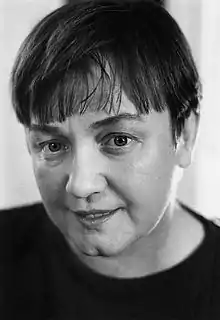Krystyna Kuperberg
Krystyna M. Kuperberg (born Krystyna M. Trybulec; 17 July 1944) is a Polish-American mathematician who currently works as a professor of mathematics at Auburn University, where she was formerly an Alumni Professor of Mathematics.[1][2][3]
Krystyna M. Kuperberg | |
|---|---|
 Krystyna Kuperberg in 1990 | |
| Born | July 17, 1944 Tarnów, Poland |
| Nationality | Polish, American |
| Alma mater | University of Warsaw (M.S.) Rice University (Ph.D.) |
| Known for | Smooth counter-example to the Seifert conjecture |
| Awards |
|
| Scientific career | |
| Fields | Topology Dynamical systems |
| Institutions | Auburn University |
| Doctoral advisors | Karol Borsuk William Jaco |
Early life and family
Her parents, Jan W. and Barbara H. Trybulec, were pharmacists and owned a pharmacy in Tarnów. Her older brother is Andrzej Trybulec. Her husband Włodzimierz Kuperberg and her son Greg Kuperberg are also mathematicians,[2][3] while her daughter Anna Kuperberg is a photographer.[3][4]
Education and career
After attending high school in Gdańsk, she entered the University of Warsaw in 1962, where she studied mathematics. Her first mathematics course was taught by Andrzej Mostowski; later she attended topology lectures of Karol Borsuk and became fascinated by topology.[2][3]
After obtaining her undergraduate degree, Kuperberg began graduate studies at Warsaw under Borsuk, but stopped after earning a master's degree.[2][3] She left Poland in 1969 with her young family to live in Sweden, then moved to the United States in 1972.[1][2][3] She finished her Ph.D. in 1974, from Rice University, under the supervision of William Jaco.[2][5][3] In the same year, both she and her husband were appointed to the faculty of Auburn University.[2][3] From 1996 to 1998, Kuperberg served as an American Mathematical Society Council member at large.[6]
Contributions
In 1987 she solved a problem of Bronisław Knaster concerning bi-homogeneity of continua.[2][3] In the 1980s she became interested in fixed points and topological aspects of dynamical systems. In 1989 Kuperberg and Coke Reed solved a problem posed by Stan Ulam in the Scottish Book.[7] The solution to that problem led to her 1993 work in which she constructed a smooth counterexample to the Seifert conjecture.[1][2][3] She has since continued to work in dynamical systems.[3]
Recognition
In 1995 Kuperberg received the Alfred Jurzykowski Prize from the Kościuszko Foundation.[2][3] Her major lectures include an American Mathematical Society Plenary Lecture in March 1995, a Mathematical Association of America Plenary Lecture in January 1996, and an International Congress of Mathematicians invited talk in 1998.[1][8] In 2012 she became a fellow of the American Mathematical Society.[9]
Selected publications
- Kuperberg, Krystyna (1994). "A smooth counterexample to the Seifert conjecture". Annals of Mathematics. (2). 140 (3): 723–732. doi:10.2307/2118623. JSTOR 2118623. MR 1307902.
- Kuperberg, Greg; Kuperberg, Krystyna (1996). "Generalized counterexamples to the Seifert conjecture". Annals of Mathematics. (2). 143 (3): 547–576. arXiv:math/9802040. doi:10.2307/2118536. JSTOR 2118536. MR 1394969. S2CID 16309410.
References
- "Krystyna Kuperberg", Biographies of Women Mathematicians, Agnes Scott College, retrieved 2014-06-24
- O'Connor, John J.; Robertson, Edmund F., "Krystyna Kuperberg", MacTutor History of Mathematics Archive, University of St Andrews
- Krystyna M. Kuperberg Archived 2014-02-05 at the Wayback Machine, Profiles of Women in Mathematics, Association for Women in Mathematics, retrieved 2014-06-24.
- Featured photographer: Anna Kuperberg, Wedding Photojournalist Association, retrieved 2014-06-24.
- Krystyna Kuperberg at the Mathematics Genealogy Project
- "AMS Committees". American Mathematical Society. Retrieved 2023-03-29.
- A Dynamical System on R3 with Uniformly Bounded Trajectories and No Compact Trajectories, August 1989, retrieved 2015-11-11.
- Kuperberg, Krystyna (1998). "Counterexamples to the Seifert conjecture". Doc. Math. (Bielefeld) Extra Vol. ICM Berlin, 1998, vol. II. pp. 831–840.
- List of Fellows of the American Mathematical Society, retrieved 2013-01-27.